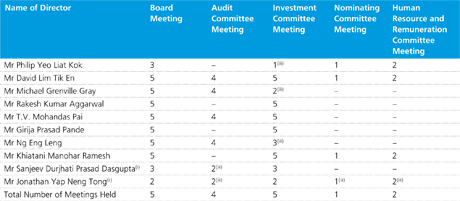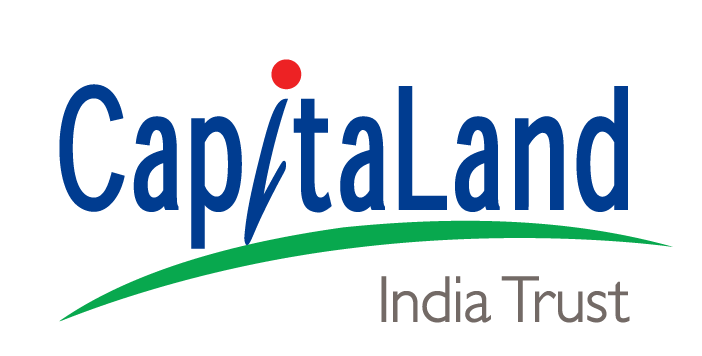Corporate Governance
INTRODUCTION
Ascendas India Trust ("Trust") is a Business Trust constituted under Singapore's Business Trusts Act, Chapter 31A, and is listed on the Main Board of SGX-ST. It is principally regulated by:
- The Securities and Futures Act, Chapter 289 ("SFA");
- The Business Trusts Act ("BTA");
- The Listing Manual of SGX-ST ("Listing Manual"); and
- The Trust Deed.
The Trust has also voluntarily adopted certain key provisions of the Code on Collective Investment Schemes ("CIS"), issued by the Monetary Authority of Singapore ("MAS"), in particular, the Property Funds Appendix under Appendix 6 of the CIS.
The Trust is managed by Ascendas Property Fund Trustee Pte. Ltd., the Trustee-Manager. The Trustee-Manager recognises that a strong and effective corporate governance culture is critical to safeguard the interests of the Trust's unitholders ("Unitholders") as a whole and is committed to maintaining high standards of corporate governance. The Trustee-Manager also ensures that applicable requirements, laws and regulations, including those mentioned above are complied with, and that the Trustee-Manager's obligations under the Trust Deed are properly carried out.
This section describes the main corporate governance policies and practices that the Trustee-Manager has implemented and abides by, with reference to the revised Code of Corporate Governance 2012 ("2012 Code").
BOARD MATTERS
Principle 1: The Board's Conduct of Affairs
Primary functions of the Board of Directors of the Trustee-Manager
The primary function of the Board of Directors of the Trustee-Manager ("Board") is to oversee the management of the Trust's assets and liabilities for the benefit of Unitholders, including generating rental income and enhancing assets so as to maximise returns from investments over time. It is the responsibility of the Board to set the strategic direction of the Trust, provide guidance towards achieving effective and efficient management of the Trust, review and approve annual business plans, budgets, investments and funding of the Trust, for the long term success of the Trust. The Board has established a framework of prudent and effective risk management practices and internal control procedures to assess and manage business risks and ensure compliance with applicable laws. The Board's role includes ensuring that obligations to Unitholders are understood and met.
Delegation by the Board
The Board has delegated the day-to-day operations of the Trust to an experienced and qualified team ("Management") headed by Mr Sanjeev Dasgupta, Executive Director and CEO of the Trustee-Manager. The Board is also assisted by Board Committees in the discharge of its functions, namely the Audit Committee ("AC"), the Investment Committee ("IC"), the Nominating Committee (“NC”) and the Human Resource and Remuneration Committee ("HRRC"), each of which operates under written terms of reference that set out the authority and duties of each Committee. For more information on these Committees, please refer to page 58 (AC), page 53 (IC), page 55 (NC) and page 56 (HRRC).
Board and Committee Meetings
The Board meets at least five times a year to discuss and review the key activities, strategies, policies, potential acquisitions and financial performance of the Trust, including approving the quarterly and full-year financial results. As and when necessary, Board meetings are also supplemented by resolutions circulated to directors for decisions.
The proposed meetings for the Board and all Board Committees for each new calendar year are set out in a schedule of meetings, which is sent to all the Board members before the start of each calendar year with a view to facilitate attendance by Board members. A record of directors' attendance at Board and Committees meetings for FY14/15 is shown below:

- Mr Sanjeev Dasgupta was appointed as Director and a member of IC on 1 October 2014
- Mr Jonathan Yap retired as Director on 1 October 2014 and ceased to be a member of IC on the same day.
- Attended by invitation.
Records of all such meetings including discussions on key deliberations and decisions taken are maintained by the Company Secretary of the Trustee-Manager ("Company Secretary"). The Trustee-Manager's Articles of Association and the Board Committee's written terms of reference allow for the meetings of the Board and Board Committees to be held via teleconferencing.
Internal guidelines
The Board has adopted a set of internal guidelines and financial regulations, which set out approval limits for, amongst others, capital expenditure, new investments and divestments, the operation of bank accounts, and bank borrowings. The Board approves transactions exceeding certain threshold limits, while delegating authority for transactions below those limits to the Investment Committee. For transactions below a certain level, the authority is further delegated to Management to facilitate operational efficiency.
The internal guides adopted by the Board also set out key matters that are specifically reserved for approval by the Board, such as a-iTrust's long term objectives and strategy, its policies and annual budgets, risk management framework and internal controls to safeguard the Unitholders' interests and assets, major capital projects, policies for compliance with legislative and regulatory requirements or other requirements with similar effect, the formation of Board Committees and their terms of reference (including delegation of Board duties to such Committees with or without limit) and any other matters which require the Board's approval as prescribed under relevant legislation, regulations or the provisions of the Trust Deed.
The Board is assisted by the Investment Committee in the evaluation and approval (within designated limits) of investments, ivestments, financing and bank facilities. The IC also reviews and provides recommendations to the Board on investment policies and the strategic direction of the Trust. The IC comprises 6 directors, namely Mr David Lim as Chairman, Mr Rakesh Aggarwal, Mr Manohar Khiatani, Mr Mohandas Pai, Mr Girija Pande and Mr Sanjeev Dasgupta. Save for Mr Khiatani and Mr Dasgupta, all IC members are considered independent. The terms of reference of the IC require at least two Committee members to be independent of Management and business relationships with the Trustee-Manager and every substantial shareholder of the Trustee-Manager.
Board orientation and training
Every newly appointed director of the Board receives a formal letter of appointment and an induction pack containing information and documents relating to the role and responsibilities of a director, Board processes, the Trustee-Manager's corporate governance practices and relevant policies and procedures.
The Trustee-Manager also conducts an induction programme for newly appointed directors to familiarise them with the Trustee-Manager's Board processes and a-iTrust's business, internal controls and governance practices.
Directors are provided with regular updates and/or briefings from time to time by professional advisers, auditors, Management and the Company Secretary in areas such as directors' duties and responsibilities, regulatory requirements, corporate governance practices, risk management issues, changes in financial reporting standards and tax, including Indian tax, laws and practices. A director may also contact Management and the Company Secretary if additional information or clarification is required relating to the aforementioned matters.
Principle 2: Board Composition and Guidance
Board Composition
There are nine directors on the Board, seven of whom (including the Chairman) are independent. Independence of the Board is maintained based on the following principles in accordance with the Business Trusts Regulations 2005 and the 2012 Code:
- At least the majority of the Board shall be independent of Management and business relationships with the Trustee-Manager;
- At least one-third of the Board shall be independent of Management and business relationships with the Trustee-Manager and every substantial shareholder of the Trustee-Manager; and
- At least the majority of directors shall be independent of any single substantial shareholder of the Trustee-Manager.
The directors as a group provide an appropriate balance and diversity of skills, experience and knowledge to the Trust. They are experienced business leaders and professionals with diverse backgrounds including real estate, accounting and finance, legal, business, management and strategic planning. They actively participate in setting and developing strategies and goals for Management and in reviewing and assessing Management's performance. There is a consistent and robust exchange of ideas and views between the Board and Management which ensures that diverse and objective perspectives on issues are carefully examined when making decisions on transactions and in shaping the Trust's strategy.
The composition of the Board is reviewed annually to ensure that the Board has the appropriate size and mix of expertise and experience. The Board is of the view that the current number of directors, the composition of the Board and the balance between non-independent and independent directors are appropriate and effective, taking into consideration the scope and nature of operations of the Trust and its subsidiaries.
The profiles of all directors are set out on pages 12 to 15 of this Annual Report.
Board Independence
The Board has conducted an annual review of each director's independence in accordance with the principles referred to above, taking into account the views of the NC. The following directors are considered independent:
Mr Philip Yeo Liat Kok;
Mr David Lim Tik En;
Mr Michael Grenville Gray;
Mr Rakesh Kumar Aggarwal;
Mr T. V. Mohandas Pai;
Mr Girija Prasad Pande; and
Mr Ng Eng Leng
(collectively, the "Independent Directors")
Mr Manohar Khiatani and Mr Sanjeev Dasgupta are considered non-independent directors. Mr Khiatani is a director on the Board of Ascendas Pte. Ltd., a deemed controlling Unitholder of the Trust and the ultimate holding company of the Trustee-Manager, and Mr Dasgupta is CEO of the Trustee-Manager.
The Statement on Composition of the Board of Directors of the Trustee-Manager pursuant to Regulation 12(8) of the Business Trusts Regulations 2005 can be found on Page 73 of this Annual Report.
Principle 3: Chairman and Chief Executive Officer
The positions of Chairman and CEO are held by two different persons to ensure an appropriate balance of power and authority, increased accountability and greater capacity of the Board for independent decision-making. The division of responsibilities between the Chairman and the CEO have been clearly established, set out in writing and agreed by the Board. The Chairman and the CEO are not immediate family members.
The Chairman's responsibilities include setting the agenda and ensuring that adequate time is available for discussion of all agenda items including strategic issues, ensuring that the Board engages Management in constructive debate on strategy, business operations, enterprise risk and other plans, facilitating the effective contribution of non-executive directors and promoting high standards of corporate governance.
The CEO is responsible for working with the Board to determine the strategy for a-iTrust and has full executive responsibilities over the business and operational decisions in the day-to-day management of the Trustee-Manager.
The CEO and Management of the Trustee-Manager are accountable to the Board.
Principle 4: Board Membership
The Nominating Committee is responsible for making recommendations to the Board on all appointments and re-appointments to the Board and oversees the succession and leadership development plan of the Trustee-Manager. The NC also reviews the independence of directors annually. The NC comprises Mr Philip Yeo, an Independent Director, as Chairman, Mr David Lim, who is also an Independent Director, and Mr Manohar Khiatani.
New directors are appointed by way of a Board resolution after the NC recommends their appointments to the Board for approval. The search for candidates to be appointed to the Board is conducted through search by and referral to the Trustee-Manager. Suitable candidates are carefully evaluated by the NC in accordance with the criteria set out in the written terms of reference of the NC so that decisions made on appointments are objective and well supported. In recommending the appointment of new Directors, the NC takes into consideration the current Board size and composition, including the diversity of skills, experience, gender and knowledge which the new Director can provide to the Trust.
Principle 5: Board Performance
A review of the Board's performance is carried out annually to assess the effectiveness of the Board as a whole and the contributions of each director. The review allows each director to express his personal and confidential assessment of the Board's overall effectiveness in accomplishing its goals and discharging its responsibilities. It provides insights into the functioning of the Board, whilst identifying areas that might need strengthening and development. The review covers the Board size, composition, independence, access to information, processes, accountability and oversight, and standards of conduct.
Accordingly, at the conclusion of FY14/15, each director was required to complete a Board performance evaluation questionnaire. Based on the questionnaire returned by each director, a consolidated report was prepared for presentation to the NC. The NC will recommend to the Board on proposed changes, if necessary, to maintain the effectiveness and efficiency of the Board. The Board is satisfied that it has achieved its performance objectives for FY14/15 and all directors have demonstrated full commitment to their roles and contributed effectively to the discharge of their duties.
Principle 6: Access to Information
Management provides the Board with complete and adequate information prior to Board meetings. The information provided includes the background and relevant details on matters to be brought before the Board, updates on financial results, business updates, property information, changes to regulations including India taxation, accounting standards and other relevant matters. In addition, Management provides monthly management accounts to the directors to keep them updated on the financial performance, position and outlook of the Trust.
At quarterly Board meetings, directors are updated on developments and changes in the operating environment, including changes in the accounting standards, changes in Singapore and India taxation, and laws and regulations affecting the Trust and/or the Trustee-Manager.
In addition, the Board has independent access to Management, the Company Secretary, internal and external auditors, at all times. Where necessary, the Board will request for independent professional advice to enable directors to discharge their duties effectively.
The role of the Company Secretary has been clearly defined by the Board. The Company Secretary administers, attends and prepares minutes of Board meetings and proceedings of all Board Committees. He/she advises the Board on all corporate governance matters and assists the Chairman of the Board and the Board Committees in implementing proper procedures for compliance with the Trust Deed and relevant rules, regulations, best practices and internal policies. Under the direction of the Chairman of the Board and the Board committees, the Company Secretary is responsible for ensuring information flows within and among the Board, the Board Committees and Management. The Company Secretary also works with Management to ensure that Board and Board Committee papers are provided to each director ahead of meetings. The Company Secretary and the CEO are the primary channels of communication between the Trustee-Manager and SGX-ST.
Remuneration matters
Principle 7: Procedures for Developing Remuneration Policies
Principle 8: Level and Mix of Remuneration
Principle 9: Disclosure on Remuneration
All fees and remuneration payable to directors, key executives and staff of the Trustee-Manager in respect of services rendered to the Trustee-Manager, will be paid by the Trustee-Manager and not out of the property of the Trust.
The structure of directors' fees for Non-Executive Directors comprises a base fee for serving as a director and additional fees for serving on Board committees. It takes into account the following:
- Financial performance of the Trust and the Trustee-Manager;
- Directors' responsibilities and contributions; and
- Industry practices and norms on remuneration, including the guidelines set out in the Statement of Good Practice issued by the Singapore Institute of Directors.
Directors' fees paid to each of the following Non-Executive Directors for FY14/15 did not exceed S$250,000:
Mr Philip Yeo Liat Kok;
Mr David Lim Tik En;
Mr Michael Grenville Gray;
Mr Rakesh Kumar Aggarwal;
Mr Ng Eng Leng;
Mr T. V. Mohandas Pai;
Mr Girija Prasad Pande; and
Mr Khiatani Manohar Ramesh.
The Trustee-Manager advocates a performance-based remuneration system for key executives of the Trustee-Manager. The system is responsive to the market and based on individual employee's performance. The remuneration structure is designed as such to retain, reward and motivate the individual to stay competitive and relevant. The total remuneration mix of key executives comprises a fixed annual salary and performance incentives. The fixed annual salary component includes the annual basic salary plus fixed allowances. The annual performance incentives are tied to the individual employee's performance and the performance of the Trust. This sought to align employee performance to the goals of the Trust.
No compensation is payable to any director, senior management or staff of the Trustee-Manager in the form of options in units or pursuant to any bonus or profit-sharing plan or any other profit-linked agreement or arrangement under the service contracts.
Directors' fees and the remuneration of key executives of the Trustee-Manager are reviewed and approved by the HRRC. The members of the HRRC are Mr Philip Yeo, who is an Independent Director, as Chairman, Mr David Lim, who is also an Independent Director, and Mr Manohar Khiatani.
Accountability and Audit
Principle 10: Accountability
The Board is responsible for providing a balanced and comprehensive assessment of the Trust's performance, position and prospects, including interim and other price sensitive public reports and reports to the regulators, if required. Financial reports and other price sensitive information are disseminated to Unitholders through announcements via SGXNET, press releases, the Trust's website, media and briefings to analysts. The Annual Report is sent to all Unitholders and is accessible on the Trust's website.
As stated above, the Board has unrestricted access to information from Management and Management regularly provides the Board with reports on the Trust's performance, position and prospects. Such reports include the Consolidated Income Statement, the Statement of Financial Position, a comparison of actuals against budgets and explanatory notes for significant variances for the month and year-to-date performance.
Principle 11: Risk Management and Internal Controls
The key risks and internal controls of the Trust have been identified by the Board working with Management and with assistance from KPMG LLP ("KPMG"), the appointed internal auditor. The risks are categorised under strategic, financial, operational and compliance risk areas. There are documented procedures in place that cover certain management accounting, financial reporting, project appraisal, compliance and other risk management issues. The Board's approach to risk management and the identified financial risk factors are outlined in Note 27 of the Financial Statements of the Trust.
The Board regularly reviews the business risks of the Trust and examines liability management and risks including those relating to the India property sector. The overall framework established by the Board to enhance the soundness of the Trust's financial reporting, risk management, compliance and internal control systems includes:
- Formulation and implementation of an enterprise risk management framework which comprises a risk register and related internal controls to mitigate such risks which is regularly reviewed by the Board;
- Audits performed by an internal auditor in accordance with the audit plan;
- Process improvement initiatives undertaken by the asset companies;
- Implementation of formal policies and procedures relating to the delegation of authority;
- Involvement of experienced and suitably qualified employees who take responsibility for important business functions; and
- Segregation of key functions which may give rise to possible errors or irregularities.
The AC assists the Board in examining the effectiveness of the Trust's risk management policies to ensure that a robust risk management system is maintained. The AC reviews and guides Management in the formulation of risk policies and processes to effectively identify evaluate and manage any material risk. The AC reports to the Board on material findings and makes recommendations in respect of any material risk issues.
To support the AC in its review of the internal controls, Management completes a checklist verifying that adequate internal controls were in place to monitor financial, legal and other relevant risks quarterly and at the end of the financial year.
In the course of their statutory audit, the external auditor had considered the risk assessment conducted by the internal auditor. Any material non-compliance and internal control weakness, together with the internal auditor's recommendations to address them, are reported to the AC.
The Trust also has both a comprehensive insurance coverage and a business continuity plan.
Whistleblowing Policy
The Trustee-Manager adopts a zero tolerance approach towards fraud. The Board has put in place a whistle-blowing policy and procedures which provide employees with well-defined and accessible channels for reporting suspected fraud, corruption, dishonest practices or other similar matters and for appropriate follow-up action to be taken. The policy and procedures aim to encourage the reporting of such matters in good faith, with confidence on the part of employees making such reports, that they will be treated fairly and, to the extent possible, be protected from reprisal.
Directors' Opinion on Internal Controls
The CEO and the Chief Financial Officer ("CFO") have provided their assurance to the Board that to the best of their knowledge, based on outcomes of on-going reviews on risk management and internal controls, and in the absence of contradictory evidence, the system of risk management and internal controls is adequate, financial records have been properly maintained and the financial statements give a true and fair review of the Trust's operations and finances.
The Board recognises the importance of sound internal controls and risk management practices for good corporate governance. The Board affirms its overall responsibility for systems of internal controls and risk management of the Trust and its subsidiaries, and for reviewing the adequacy and integrity of those systems on an annual basis. The internal control and risk management functions are performed by key executives and are reported to the AC for review.
The internal control systems include the safeguarding of assets, the maintenance of proper accounting records, the reliability of financial information, compliance with appropriate legislation, regulations and best practices, and the identification and containment of business risks. Such systems are designed to manage rather than to eliminate the risk of failure to achieve business objectives and provide only reasonable, and not absolute, assurance against material misstatement of loss. The Board also notes that all internal control systems contain inherent limitations and no system of internal controls can provide absolute assurance against the occurrence of material errors, poor judgment in decision-making, human error losses, fraud or other irregularities.
Based on the system of risk management and internal controls established and maintained within the Trust and its subsidiaries, work performed by the internal and external auditors, and reviews performed by Management, various Board Committees and the Board, and the assurance from the CEO and the CFO, the Board, with the concurrence of the Audit Committee, are of the opinion that the system of risk management and internal controls addressing material financial, operational, compliance and information technology risks of the Trust and its subsidiaries were adequate and effective as at 31 March 2015 in addressing material risks.
Principle 12: Audit Committee
The Audit Committee comprises Mr Michael Gray as Chairman, Mr David Lim, Mr Mohandas Pai and Mr Ng Eng Leng. All AC members, including the Chairman, are considered independent.
The Board is of the view that the members of the AC are appropriately qualified to discharge their responsibilities. Between Mr Gray, Mr Lim, Mr Pai and Mr Ng, they have extensive accounting related financial management and legal expertise and experience.
The AC's primary role is to assist the Board in discharging its statutory and other responsibilities relating to internal controls, financial and accounting matters, compliance, business and financial risk management. The AC's responsibilities include:
- Reviewing the procedures put in place to address any conflict that may arise between the interests of the Unitholders and the interests of the Trustee-Manager, including interested person transactions, the indemnification of expenses or liabilities incurred by the Trustee-Manager and the setting of fees and charges payable out of the Trust property;
- Reviewing with the external auditors and internal auditors, the audit plans and reports and the evaluation of the system of internal accounting controls, based on the recommendations and observations of the auditors;
- Reviewing significant financial reporting issues and treatments so as to ensure the integrity of the financial statements of the Trust and recommending to the Board the financial statements for release to the SGX-ST;
- Reviewing the scope of internal audits, the reports and its cost effectiveness, which includes ensuring that where deficiencies in internal controls have been identified, appropriate and prompt remedial action is taken by the Management;
- Reviewing policies and practices put in place by Management to ensure compliance with applicable laws, regulations, guidelines and constitutional documents of the Trust;
- Recommending the appointment, re-appointment and removal of the external or internal auditors to the Board;
- Reviewing the independence and objectivity of the external auditors annually, including considering the nature and extent of the non-audit services performed by them;
- Meeting external and internal auditors, without the presence of the Management, at least once annually;
- Reviewing and reporting to the Board on any inadequacies, deficiencies or matters of concern of which the AC becomes aware or that it suspects, arising from its review of internal financial controls, operational and compliance controls and risk management policies and systems of the Trustee-Manager and the Trust;
- Reviewing and reporting to the Board any breach of applicable laws and regulations that the AC becomes aware of or that it may suspect;
- Reporting to MAS if the AC is of the view that the Board has not taken, or does not propose to take, appropriate action to deal with any matter reported by the AC to the Board;
- Undertaking such other functions as may be agreed to by the AC and the Board; and
- Investigating any matters within the AC's terms of reference, whenever it deems necessary.
For FY14/15, the AC held four meetings during the year. The AC has reviewed the external and internal auditors' findings. The AC also met with the external and internal auditors without the presence of the Management. The AC is satisfied with the processes put in place to mitigate fraud risk exposure in the Trust. The AC is also satisfied that the whistle blowing arrangements put in place by Management provide a channel through which staff may, in confidence, raise concerns about possible improprieties in matters of financial reporting or other matters. The external and internal auditors have updated the AC members on changes to accounting standards and issues which have a direct impact on financial statements during the AC meetings in FY14/15.
External Audit
Ernst & Young LLP ("EY") was appointed as the external auditor for the Trust and its subsidiaries. Unitholders' approval was obtained for their re-appointment at the last Annual General Meeting ("AGM") on 10 July 2014. EY will hold office until the conclusion of the coming AGM. The AC has assessed the performance of the external auditor based on factors such as the performance and quality of their audit and the independence of the auditor.
The Trustee-Manager confirms that it has complied with Rules 712(1) and 715 of the Listing Manual of the SGX-ST as EY is registered with the Accounting and Corporate Regulatory Authority.
To assess the independence of the external auditor, the AC also reviewed the non-audit services provided by the external auditor during the financial year and the quantum of fees paid for such services. The AC is satisfied that the independence of the external auditor was not compromised in any way by the provision of such non-audit services.
The table below sets out the fees and expenses paid/accrued to EY for FY14/15:

On the basis of the above, the AC has recommended to the Board the re-appointment of EY as the independent external auditor of the Trust and its subsidiaries at the coming Annual General Meeting of the Unitholders.
Principle 13: Internal Audit
The internal auditors assist the AC in ensuring that Management maintains a sound system of internal controls by regular monitoring of key controls and procedures and ensuring their continued effectiveness. In the financial year under review, the internal audit function of the Trust was carried out by KPMG.
Staffed by qualified executives, KPMG has unrestricted access to the AC. KPMG reports to the Chairman of the AC and is guided by the Standards for the Professional Practice of Internal Auditing. During the year, KPMG adopted a risk-based auditing approach covering financial, operational and compliance controls. Internal audits were carried out on all the Venture Capital Undertakings of the Trust. Internal audit reports were submitted to the AC for review and the summary of findings and recommendations were discussed at the AC meetings.
The AC has reviewed the internal audit function in the financial year under review and is satisfied of its adequacy and independence from the activities it audits.
Unitholders' Rights
Principle 14: Unitholders' Rights
Principle 15: Communication with Unitholders
Principle 16: Conduct of Unitholders' Meetings
The Trustee-Manager is committed to open and regular communication with the investment community, in particular, with its Unitholders. Quarterly results with detailed financial and operational metrics are publicly available on the Trust's and SGX-ST's websites. The Trust's website also contains the Trust's disclosed financial information, annual reports, investor presentation slides, distribution notices, press releases and other material developments announced through the SGX-ST's website.
Investor relations matters are handled by Management's investor relations team. Management meets with analysts and institutional investors regularly to promote the Trust, communicate its business performance and developments, and gather views and feedback. Management participates in local and overseas conferences organised by securities houses and banks. Management also addresses queries raised by retail Unitholders via phone calls, emails or the website. Such regular interactions allow Management to consider feedback from the investment community before formulating capital management strategies and Unitholders' resolutions. An investor relations policy has been put in place as part of Management's commitment to provide timely and transparent information to the investment community.
For the forthcoming AGM, the Board will be in attendance to address Unitholders' queries. EY, the external auditor for the Trust, has also been invited to attend the AGM and assist directors in addressing queries from Unitholders relating to the conduct of the audit and the preparation and content of the audited financial statements of the Trust.
The Board fully supports Unitholders' participation at AGMs and Unitholders are accorded the opportunity to raise relevant questions and to communicate their views. A registered Unitholder may, through proxy forms sent in advance, appoint up to 2 proxies to attend and vote. To ensure transparency, the Trustee-Manager had employed electronic poll voting since the AGM in 2012. All votes cast for or against and their respective percentages will be displayed "live" immediately at the meeting after the conduct of each poll. It also promptly issues a detailed announcement of the poll results (both in absolute numbers and percentages of votes cast for and against a resolution) on SGX-ST's website after the close of the general meeting.
The Company Secretary prepares minutes of Unitholders' meetings, which incorporate substantial comments or queries from Unitholders and responses from the Board and Management. These minutes are available to Unitholders upon request in writing.
Additional Information
Dealings in Units
The Trust has adopted a trading policy based on SGX-ST's best practices on dealings in securities. Directors and employees of the Trustee-Manager and relevant employees of the Trustee-Manager's related corporations have been informed about the prohibition from dealing in the Units as follows:
- During the period commencing one month before the public announcement of the Trust's annual financial results and two weeks before the public announcement of the Trust's quarterly financial results, and ending on the date of announcement of the relevant results; and
- At any time while in possession of price sensitive information.
The policy also discourages trading on short-term considerations.
Each director of the Trustee-Manager is required to give notice in writing to the Trustee-Manager of his acquisition of Units or changes to the number of Units held in his interests, within two business days after such director is appointed or upon the occurrence of any of the aforesaid events.
All dealings in Units by directors will be announced via SGXNET, with the announcement to be posted on the internet on SGX-ST's website http://www.sgx.com and the Trust's website http://www.a-itrust.com.
In addition, the Trustee-Manager will announce to the SGX-ST the particulars of its holdings in the Units and any changes thereto, by the end of the business day following the day on which it acquires or disposes of any Units.


































